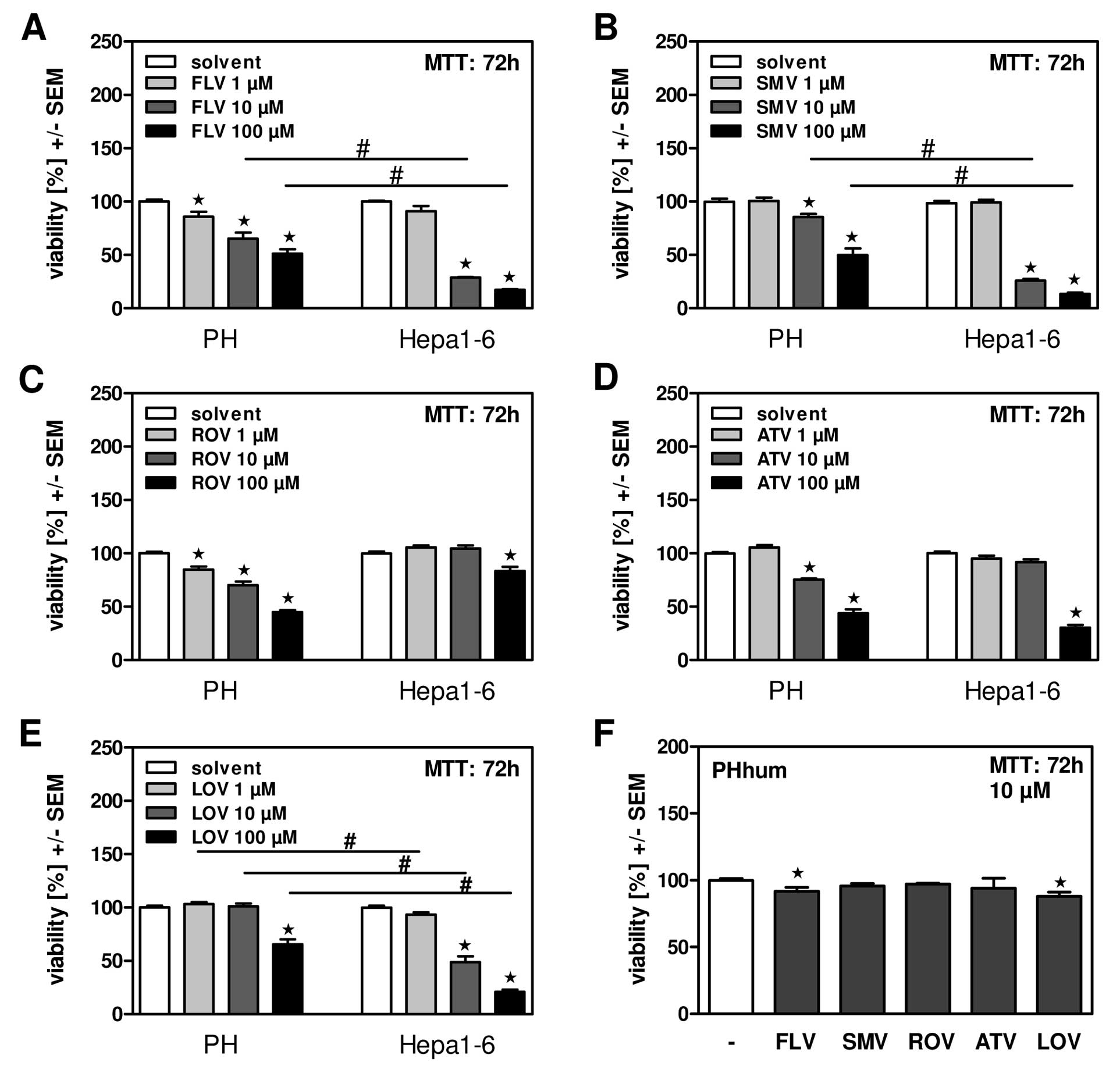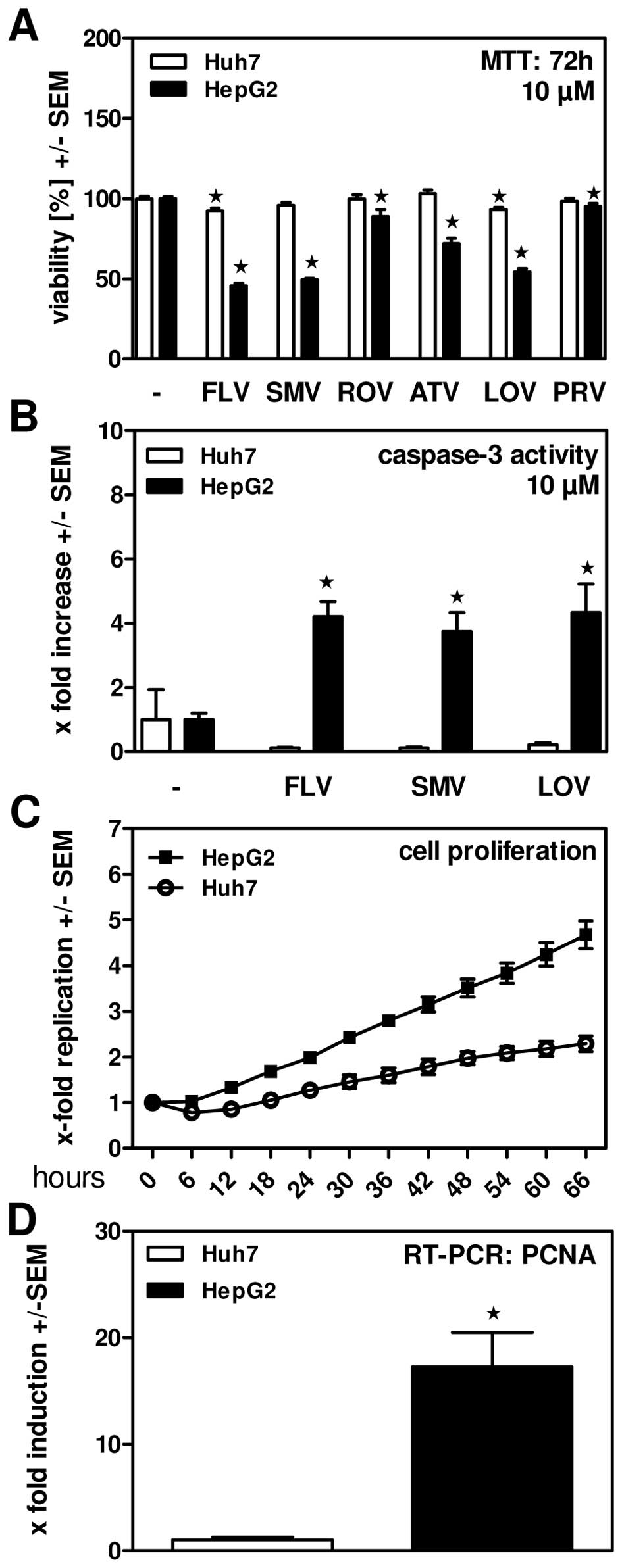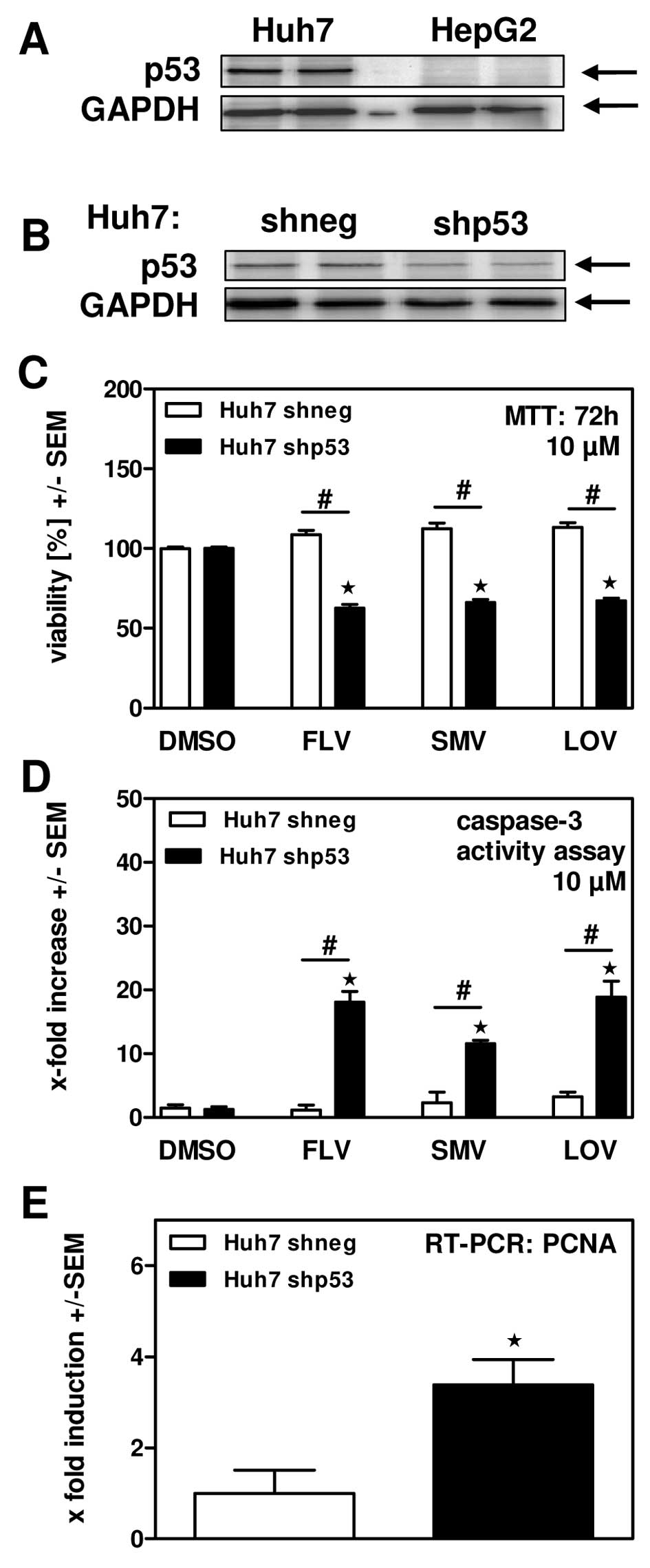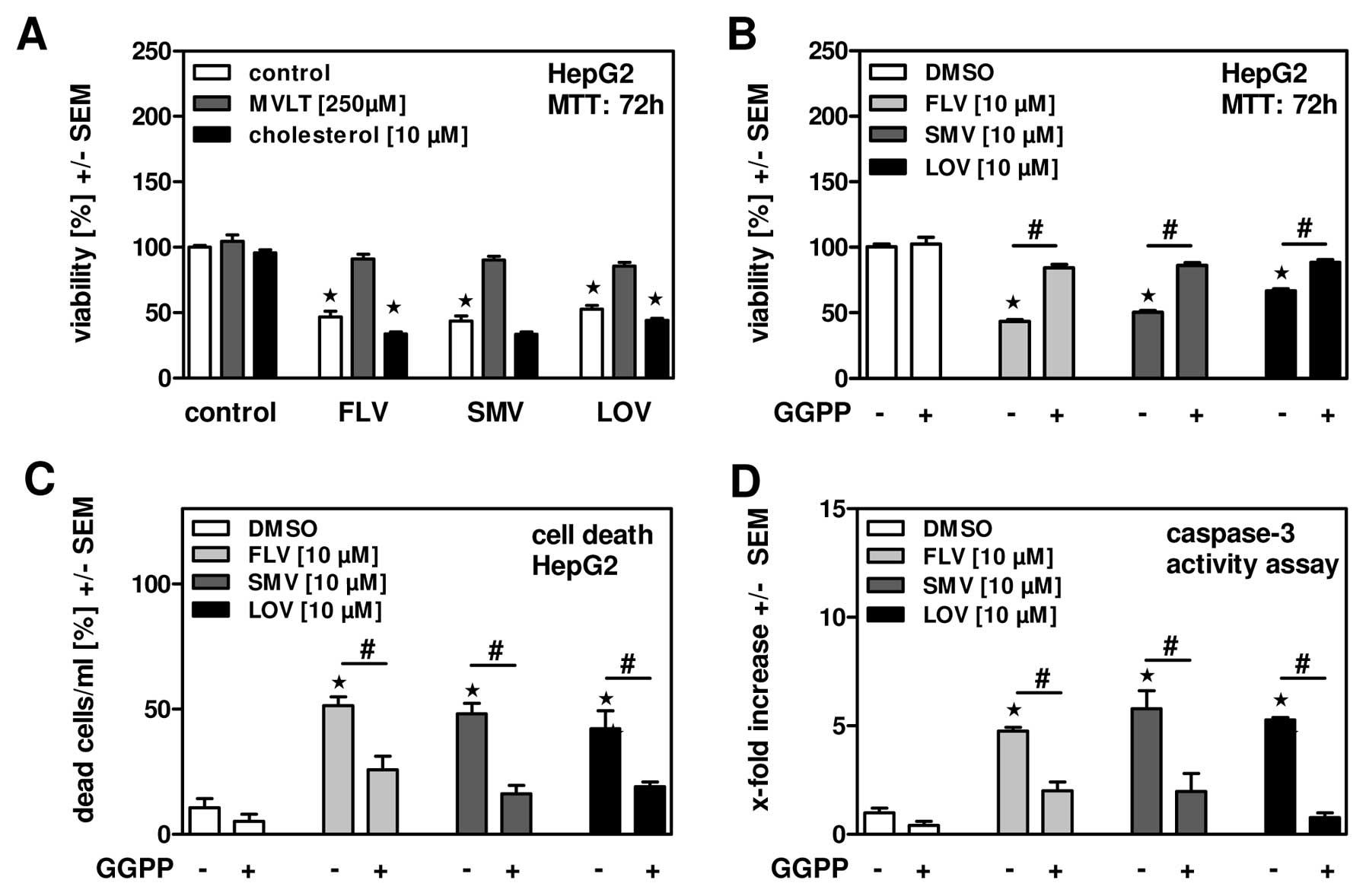|
1
|
Bader T and Korba B: Simvastatin
potentiates the anti-hepatitis B virus activity of FDA-approved
nucleoside analogue inhibitors in vitro. Antiviral Res. 86:241–245.
2010. View Article : Google Scholar : PubMed/NCBI
|
|
2
|
Delang L, Paeshuyse J, Vliegen I, Leyssen
P, Obeid S, Durantel D, Zoulim F, Op de Beeck A and Neyts J:
Statins potentiate the in vitro anti-hepatitis C virus activity of
selective hepatitis C virus inhibitors and delay or prevent
resistance development. Hepatology. 50:6–16. 2009. View Article : Google Scholar : PubMed/NCBI
|
|
3
|
Ikeda M, Abe K, Yamada M, Dansako H, Naka
K and Kato N: Different anti-HCV profiles of statins and their
potential for combination therapy with interferon. Hepatology.
44:117–125. 2006. View Article : Google Scholar : PubMed/NCBI
|
|
4
|
Murtola TJ, Tammela TL, Määttänen L,
Huhtala H, Platz EA, Ala-Opas M, Stenman UH and Auvinen A: Prostate
cancer and PSA among statin users in the finnish prostate cancer
screening trial. Int J Cancer. 127:1650–1659. 2010. View Article : Google Scholar : PubMed/NCBI
|
|
5
|
Ishikawa S, Nagai Y, Masuda T, Koga Y,
Nakamura T, Imamura Y, Takamori H, Hirota M, Funakosi A, Fukushima
M and Baba H: The role of oxysterol binding protein-related protein
5 in pancreatic cancer. Cancer Sci. 101:898–905. 2010. View Article : Google Scholar : PubMed/NCBI
|
|
6
|
El-Serag HB, Johnson ML, Hachem C and
Morgana RO: Statins are associated with a reduced risk of
hepatocellular carcinoma in a large cohort of patients with
diabetes. Gastroenterology. 136:1601–1608. 2009. View Article : Google Scholar : PubMed/NCBI
|
|
7
|
Kuoppala J, Lamminpää A and Pukkala E:
Statins and cancer: a systematic review and meta-analysis (review).
Eur J Cancer. 44:2122–2132. 2008. View Article : Google Scholar : PubMed/NCBI
|
|
8
|
Llovet JM, Ricci S, Mazzaferro V, Hilgard
P, Gane E, Blanc JF, de Oliveira AC, Santoro A, Raoul JL, Forner A,
Schwartz M, Porta C, Zeuzem S, Bolondi L, Greten TF, Galle PR,
Seitz JF, Borbath I, Häussinger D, Giannaris T, Shan M, Moscovici
M, Voliotis D and Bruix J; SHARP Investigators Study Group.
Sorafenib in advanced hepatocellular carcinoma. N Engl J Med.
359:378–390. 2008. View Article : Google Scholar : PubMed/NCBI
|
|
9
|
Cheng AL, Kang YK, Chen Z, Tsao CJ, Qin S,
Kim JS, Luo R, Feng J, Ye S, Yang TS, Xu J, Sun Y, Liang H, Liu J,
Wang J, Tak WY, Pan H, Burock K, Zou J, Voliotis D and Guan Z:
Efficacy and safety of sorafenib in patients in the Asia-Pacific
region with advanced hepatocellular carcinoma: a phase III
randomised, doubleblind, placebo-controlled trial. Lancet Oncol.
10:25–34. 2009. View Article : Google Scholar : PubMed/NCBI
|
|
10
|
Parkin DM, Bray F, Ferlay J and Pisani P:
Estimating the world cancer burden: Globocan 2000. Int J Cancer.
94:153–156. 2001. View
Article : Google Scholar : PubMed/NCBI
|
|
11
|
Relja B, Meder F, Wilhelm K, Henrich D,
Marzi I and Lehnert M: Simvastatin inhibits cell growth and induces
apoptosis and G0/G1 cell cycle arrest in hepatic cancer cells. Int
J Mol Med. 26:735–741. 2010. View Article : Google Scholar : PubMed/NCBI
|
|
12
|
Zhang W, Wu J, Zhou L, Xie HY and Zheng
SS: Fluvastatin, a lipophilic statin, induces apoptosis in human
hepatocellular carcinoma cells through mitochondria-operated
pathway. Indian J Exp Biol. 48:1167–1174. 2010.
|
|
13
|
Cao Z, Fan-Minogue H, Bellovin DI,
Yevtodiyenko A, Arzeno J, Yang Q, Gambhir SS and Felsher DW: MYC
phosphorylation, activation, and tumorigenic potential in
hepatocellular carcinoma are regulated by HMG-CoA reductase. Cancer
Res. 71:2286–2297. 2011. View Article : Google Scholar : PubMed/NCBI
|
|
14
|
Relja B, Meder F, Wang M, Blaheta R,
Henrich D, Marzi I and Lehnert M: Simvastatin modulates the
adhesion and growth of hepatocellular carcinoma cells via decrease
of integrin expression and ROCK. Int J Oncol. 38:879–885. 2011.
View Article : Google Scholar : PubMed/NCBI
|
|
15
|
Gao J, Jia WD, Li JS, Wang W, Xu GL, Ma
JL, Ge YS, Yu JH, Ren WH, Liu WB and Zhang CH: Combined inhibitory
effects of celecoxib and fluvastatin on the growth of human
hepatocellular carcinoma xenografts in nude mice. J Int Med Res.
38:1413–1427. 2010. View Article : Google Scholar : PubMed/NCBI
|
|
16
|
Kim W, Yoon JH, Kim JR, Jang IJ, Bang YJ,
Kim YJ and Lee HS: Synergistic anti-tumor efficacy of lovastatin
and protein kinase C-beta inhibitor in hepatocellular carcinoma.
Cancer Chemother Pharmacol. 64:497–507. 2009. View Article : Google Scholar : PubMed/NCBI
|
|
17
|
Neuvonen PJ: Drug interactions with
HMG-CoA reductase inhibitors (statins): the importance of CYP
enzymes, transporters and pharmacogenetics (review). Curr Opin
Investig Drugs. 11:323–332. 2010.PubMed/NCBI
|
|
18
|
Brown WV: Safety of statins. Curr Opin
Lipidol. 19:558–562. 2008. View Article : Google Scholar
|
|
19
|
Nakabayashi H, Taketa K, Yamane T,
Miyazaki M, Miyano K and Sato J: Phenotypical stability of a human
hepatoma cell line, HuH-7, in long-term culture with chemically
defined medium. Gann. 75:151–158. 1984.PubMed/NCBI
|
|
20
|
Aden DP, Fogel A, Plotkin S, Damjanov I
and Knowles BB: Controlled synthesis of HBsAg in a differentiated
human liver carcinoma-derived cell line. Nature. 282:615–616. 1979.
View Article : Google Scholar : PubMed/NCBI
|
|
21
|
Darlington GJ, Bernhard HP, Miller RA and
Ruddle J: Expression of liver phenotypes in cultured mouse hepatoma
cells. J Natl Cancer Inst. 64:809–819. 1980.PubMed/NCBI
|
|
22
|
Seglen PO: Preparation of rat liver cells.
3 Enzymatic requirements for tissue dispersion. Exp Cell Res.
82:391–398. 1973. View Article : Google Scholar : PubMed/NCBI
|
|
23
|
Dandri M, Burda MR, Török E, Pollok JM,
Iwanska A, Sommer G, Rogiers X, Rogler CE, Gupta S, Will H, Greten
H and Petersen J: Repopulation of mouse liver with human
hepatocytes and in vivo infection with hepatitis B virus.
Hepatology. 33:981–988. 2001. View Article : Google Scholar : PubMed/NCBI
|
|
24
|
Moffat J, Grueneberg DA, Yang X, Kim SY,
Kloepfer AM, Hinkle G, Piqani B, Eisenhaure TM, Luo B, Grenier JK,
Carpenter AE, Foo SY, Stewart SA, Stockwell BR, Hacohen N, Hahn WC,
Lander ES, Sabatini DM and Root DE: A lentiviral RNAi library for
human and mouse genes applied to an arrayed viral high-content
screen. Cell. 124:1283–1298. 2006. View Article : Google Scholar : PubMed/NCBI
|
|
25
|
Gloesenkamp CR, Nitzsche B, Ocker M, Di
Fazio P, Quint K, Hoffmann B, Scherübl H and Höpfner M: AKT
inhibition by triciribine alone or as combination therapy for
growth control of gastroenteropancreatic neuroendocrine tumors. Int
J Oncol. 40:876–888. 2012.PubMed/NCBI
|
|
26
|
Bressac B, Galvin KM, Liang TJ,
Isselbacher KJ, Wands JR and Ozturk M: Abnormal structure and
expression of p53 gene in human hepatocellular carcinoma. Proc Natl
Acad Sci USA. 87:1973–1977. 1990. View Article : Google Scholar : PubMed/NCBI
|
|
27
|
Chan KKW, Oza AM and Siu LL: The statins
as anticancer agents. Clin Cancer Res. 9:10–19. 2003.
|
|
28
|
Konstantinopoulos PA, Karamouzis MV and
Papavassiliou AG: Post-translational modification and regulation of
the RAS superfamily of GTPases as anticancer targets. Nat Rev Drug
Discov. 6:541–555. 2007. View
Article : Google Scholar : PubMed/NCBI
|
|
29
|
Roy M, Kung HJ and Ghosh PM: Statins and
prostate cancer: role of cholesterol inhibition vs. prevention of
small GTP-binding proteins. Am J Cancer Res. 1:542–561.
2011.PubMed/NCBI
|
|
30
|
Sutter AP, Maaser K, Höpfner M, Huether A,
Schuppan D and Scherübl H: Cell cycle arrest and apoptosis
induction in hepatocellular carcinoma cells by HMG-CoA reductase
inhibitors. Synergistic antiproliferative action with ligands of
the peripheral benzodiazepine receptor. J Hepatol. 43:808–816.
2005. View Article : Google Scholar
|


















